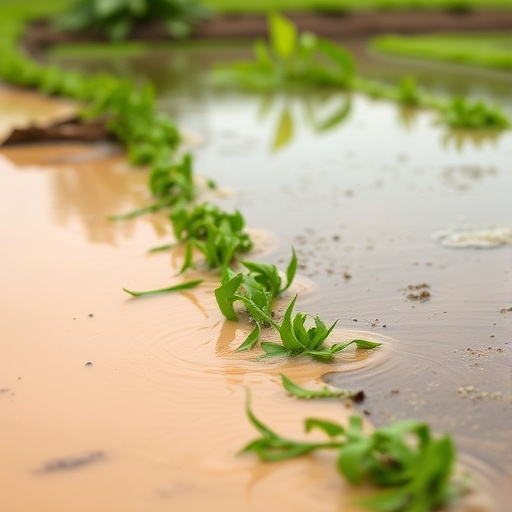In recent years, agricultural practices have been increasingly challenged by unpredictable climate variability, leaving farmers in dire need of reliable methods to assess crop water dynamics and irrigation reliance. A groundbreaking study led by a team of researchers from India, including Rao, Munivenkatappa, and Singh, draws attention to this pressing issue through a comprehensive examination of key Kharif crops in the Araniar command area of Andhra Pradesh. Their work, spanning from 1990 to 2024, employs the CROPWAT model, effectively modeling diverse crop water requirements under climatic fluctuations.
The CROPWAT model is renowned for its ability to simulate water requirements for various crops by integrating weather data, soil characteristics, and crop growth conditions. In this study, researchers meticulously gathered long-term data to derive insights into irrigation dependency amidst climate variability, a crucial aspect for sustainable agricultural development. The vital statistics compiled in their analysis reveal that certain crops exhibit a heightened sensitivity to fluctuating weather patterns, demanding strategic irrigation planning to optimize productivity.
Kharif crops, which are predominantly grown during the monsoon season in many parts of India, are particularly vulnerable to changes in rainfall patterns. The study highlights how erratic monsoon behaviors influence water availability, consequently impacting the growth and yield of essential crops. With changing climate conditions, there’s a continual threat of droughts and floods, which jeopardizes food security. By utilizing the CROPWAT model, the researchers determined specific irrigation schedules tailored to the climatic conditions projected for the future.
A critical aspect of the study was the regional focus on Andhra Pradesh, which serves as one of India’s agricultural backbones. The Araniar command area has been characterized by varied climate conditions and a rich agricultural history. By leveraging historical climate data, researchers were able to identify trends that inform current agricultural practices. This approach not only cultivates better farming strategies but also enhances the adaptive capacity of farmers facing the repercussions of climate change.
As the study progresses, it becomes evident that agricultural stakeholders need to understand water dynamics thoroughly. The water requirements of crops vary significantly based on stages of growth, soil moisture levels, and prevailing weather conditions. By comprehensively addressing these factors through the CROPWAT model, the team has illuminated pathways toward more efficient water use practices that can mitigate irrigation dependency.
The repercussions of climate variability extend beyond mere agricultural output; they impact farmers’ livelihoods, local economies, and national food security. Through their robust analysis, Rao and his colleagues have underscored the necessity for policymakers to adopt sustainable irrigation practices that are responsive and resilient to climatic uncertainties. Strategies developed from these findings could potentially transform agricultural frameworks, supporting not just productivity but eco-friendliness.
Additionally, the significance of community involvement cannot be overstated. Farmers are often the first to experience the adversities of such climatic shifts. Thus, the study advocates for educational initiatives that inform agricultural communities on best practices in water management, crop selection, and innovative irrigation techniques. An informed farmer is an empowered one, capable of making better decisions based on scientific insights.
Importantly, the study emphasizes the need to harness technology, not just for monitoring purposes but also for predictive analytics as it pertains to crop-water relationships. Real-time data can provide farmers with actionable insights, optimizing irrigation schedules and enabling adaptive responses to unforeseen climatic changes. The CROPWAT model exemplifies such technological application, and its continued evolution is essential for the agricultural sector.
As the research progresses towards its conclusion, it becomes clear that the integration of climate data into agricultural planning is not just beneficial but essential. Long-term assessments and real-time monitoring systems could guide farmers to achieve optimal irrigation and resource efficiency. Researchers foresee that such methodologies can help to ensure resilience against climate variability, ultimately leading to a more sustainable agricultural future.
In light of these findings, the agricultural community is urged to embrace a shift towards data-driven practices. As climate conditions continue to evolve, the reliance on traditional farming practices without the aid of modern technology may no longer suffice. The tools and insights offered by tools like the CROPWAT model can form the backbone of a submission for future policy-making aimed at navigating the complexities of crop water dynamics.
As India grapples with the harsh realities of climate change, studies like this play a critical role in laying the groundwork for adaptive strategies. Researchers continue to emphasize that the future of agriculture lies in our ability to withstand and adapt to changing environments through informed decisions and innovative practices. The ripple effects of resilient agricultural practices will invariably resonate through various sectors, contributing to the socio-economic fabric of communities.
The research team’s dedicated work has made significant strides in recognizing and addressing the challenges posed by climate variability. This study marks a pivotal moment in agricultural research—an appeal for a collaborative approach that brings together scientists, farmers, policymakers, and technological innovators for a sustainable agricultural horizon, forging pathways for future generations. The insights garnered from the Araniar command area are not merely numbers on a page but the livelihoods of farmers, the food on our tables, and the future of global agriculture.
Subject of Research: Assessment of crop water dynamics and irrigation dependency for Kharif crops under climate variability.
Article Title: Long-term assessment of crop water dynamics and irrigation dependency for selected major Kharif crops under climate variability using the CROPWAT Model in the Araniar command area, Andhra Pradesh, India (1990–2024).
Article References: Rao, P.S., Munivenkatappa, R.G., Singh, B.G. et al. Long-term assessment of crop water dynamics and irrigation dependency for selected major Kharif crops under climate variability using the CROPWAT Model in the Araniar command area, Andhra Pradesh, India (1990–2024). Discov. Plants 2, 340 (2025). https://doi.org/10.1007/s44372-025-00396-w
Image Credits: AI Generated
DOI: https://doi.org/10.1007/s44372-025-00396-w
Keywords: Kharif crops, climate variability, CROPWAT model, irrigation dependency, sustainable agriculture, Andhra Pradesh.




